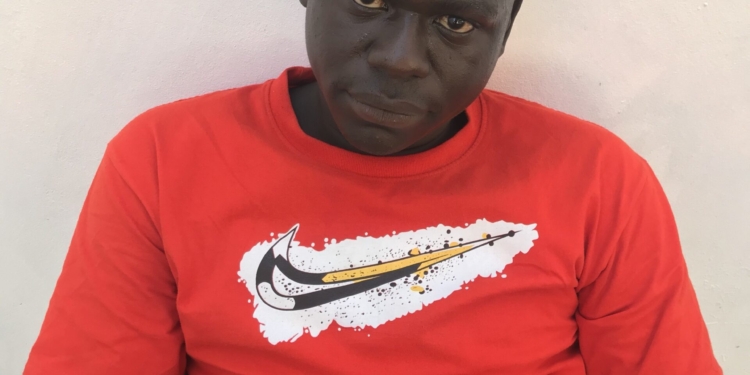By Zainab Jobarteh
Ebrima Beyai has suffered pain since 2016 because he was at the wrong place at the wrong time.
The 25-year-old footballer was riding his scooter to a political party when he had the misfortune of running into President Yahya Jammeh’s motorcade. It was an election year and politicians, including the president, were on the campaign trail.
Ebrima was looking forward to attending the rally. He was eager to listen to the leaders of his favourite political party. He was among the Gambians who were ready to embrace change from the more than two decades of Jammeh’s rule. His T-shirt with the popular slogan “Gambia has decided” portrayed his political leaning. The slogan was coined after opposition parties came together to form a coalition in efforts to unseat Jammeh in the 2016 election. The government and its supporters considered people who donned the T-shirts enemies of the state.
As he rode along, a vehicle in the presidential convoy hit him and he was thrown into a gutter. He regained consciousness in hospital and learnt that some Good Samaritans had brought him in. And just like that, Ebrima’s nightmare started. He spent one-and-a-half years in the hospital. Doctors told him that he needed specialised treatment because a bone in his left thigh was shattered. He struggled to pay the bills and his poor parents could not help him. He resorted to appealing to the public and was lucky that Saul Mbenga, who lives in America, volunteered to clear his medical bills.
Ebrima later learned that the vehicle that had injured him belonged to the leader of the Green Youths, Lamin Sonko, who briefly visited him in hospital two times, then disappeared. He never accepted responsibility for the accident or offered to help Ebrima pay his medical bills.
The Green Youths followed Yahya Jammeh everywhere he went on his nationwide tours. Dressed in green uniforms, they usually ran in front of Jammeh’s convoy, singing praises to the president. Sometimes they would sit at the back of trucks. They always travelled in large numbers and often attacked opposition supporters. Jammeh spent a considerable amount of money taking care of them.
The doctors told Ebrima that he needed to travel to Senegal for surgery. However, he had to continue enduring the crippling pain because he could not afford the treatment. He could only hope that another Good Samaritan would help him. His pleas were finally answered when Essa Faal, the Lead Counsel of the Truth, Reconciliation and Reparations Commission, offered to pay for the surgery. Ebrima still attends doctors’ appointments and is using crutches as he recovers from his surgery.
Although the accident turned Ebrima’s life upside down, it was not unique during that time. Accidents involving the presidential motorcade were not uncommon. All motorists were expected to give way to the presidential convoy. Sometimes roads were closed to public and private vehicles, inconveniencing students, workers, and travellers alike. People were known to cancel appointments when Jammeh was in the area. Students had to walk long distances because even school buses were not allowed on the roads.
I had assumed that although Ebrima was using crutches, his leg had healed after all those years, so I asked him to show me his wound. I was so shocked that I quickly looked away. The wound looked fresh.
As I left, I thought of the young man who once had a promising future until some uncaring driver suddenly halted his dreams. Now Ebrima cannot do the things he used to do effortlessly. All because he happened to be on the highway at the same time as Yahya Jammeh and a group of Green Youths.







